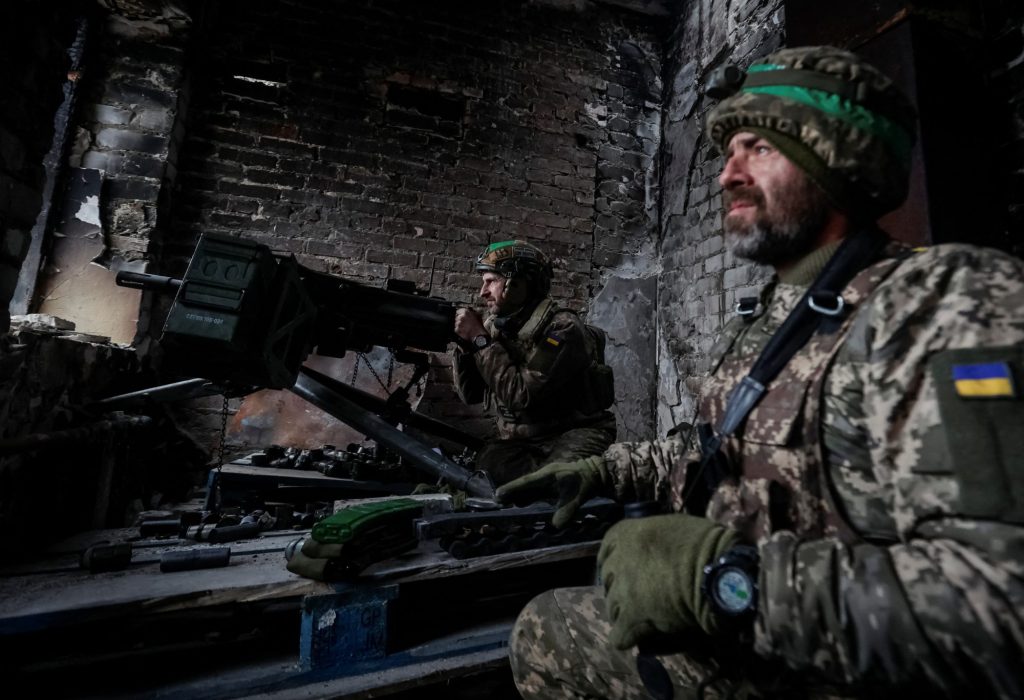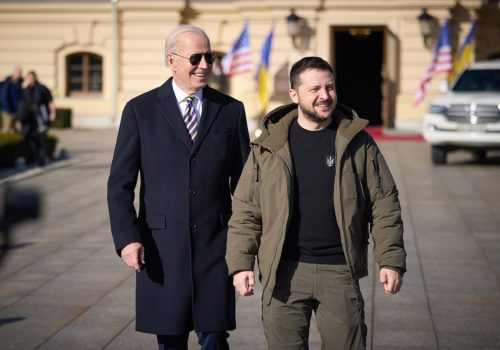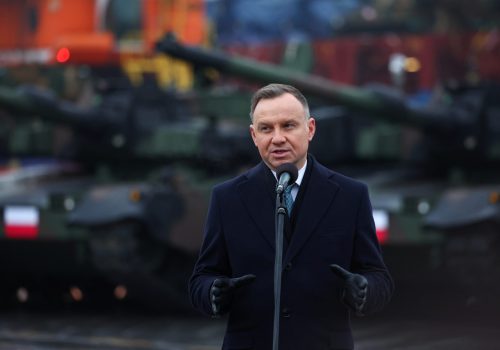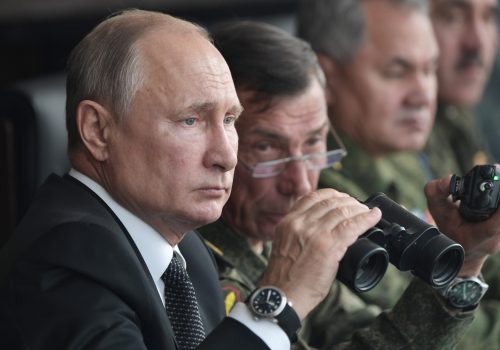No Ukrainian will ever forget the morning of February 24, 2022, when life as we knew it was shattered by the enormity of Russia’s full-scale invasion. I was awoken in Lviv that morning by a constant stream of phone calls from people asking for help. This was nothing new, as I had been supporting the Ukrainian military since the onset of Russia’s attack on Ukraine in 2014. However, it was immediately apparent that we were facing something on a different scale entirely; the largest European war since the days of Hitler and Stalin was underway in my homeland.
Despite the horror of the situation, Ukrainians did not panic. Many made their way to join the military or signed up for local territorial defense units. Others brought vital supplies including everything from food and medicines to bullets and bulletproof vests. People across the country begun fundraising via social media and other online platforms. Civil society support networks developed through Ukraine’s two people power revolutions and the past eight years of resistance to Russian aggression in Crimea and eastern Ukraine grew larger and stronger. Just hours after news of the Russian invasion had stunned the watching world, Ukrainians were already establishing logistical channels that would allow civilian volunteers to support the fightback.
I rushed to Kyiv while issuing a social media appeal for people to come and collect what supplies we had from our office, which had already been transformed into a volunteer hub. Within a couple of days, we had assembled an entire team to work on meeting the needs of Ukraine’s defenders. It soon became clear that nothing is impossible for Ukrainians. The entire nation united in defiance of Russia’s invasion. On the battlefield, Ukrainian troops out-thought and outfought the Russian invaders with a combination of innovative tactics and raw courage. Using a range of newly acquired Western arms along with older weapons largely inherited from the Soviet era, they were able to destroy entire columns of Russian tanks and inflict devastating casualties on Putin’s army.
Ukraine’s remarkable resilience would have a profound impact on global opinion and would go on to shape the international response to the Russian invasion. On the eve of Russia’s attack, many Western leaders believed Ukraine would fall within a matter of days and were deeply reluctant to provide weapons, partly as they feared their technology would soon be captured by the advancing Russians. However, when it became apparent that Ukrainians were both willing and able to resist the invasion, the democratic world soon warmed to the idea of supporting Ukraine in its fight for survival. A dramatic shift began to take place with more and more countries lining up to stand with Ukraine. Looking back, it is now clear that the strength of the Ukrainian nation in those momentous first days of war changed the course of world history.
Stay updated
As the world watches the Russian invasion of Ukraine unfold, UkraineAlert delivers the best Atlantic Council expert insight and analysis on Ukraine twice a week directly to your inbox.
As the war unfolded during the spring months, so too did Ukraine’s volunteer efforts. Improvised initiatives to source supplies for volunteer fighters rapidly evolved into nationwide projects with the support of millions of private and corporate donors both in Ukraine and across Europe, North America, and beyond. By summer 2022, Ukrainians were crowdfunding sophisticated combat drones, armored vehicles, and a satellite. Since the first days of the invasion, Ukrainian social media has been full of posts showing the latest deliveries of drones, jeeps, radio equipment, and night vision goggles for the troops on the front lines. These efforts have made it easier for the government to concentrate its limited resources on acquiring big ticket items such as artillery, air defense, and missile systems.
Ukraine’s popular resistance has undoubtedly impressed the world. This is evident in the reactions I encounter while traveling to Western capitals. I sense a sincere respect for the Ukrainian people when speaking with government officials and members of the public alike; I can also see this respect in the countless Ukrainian flags on display throughout the Western world that serve as universal symbols of freedom and bravery. Most of all, the West has shown its support by providing Ukraine with billions of dollars in military aid. These Western weapons have had a major impact on the course of the war, enabling Ukraine to destroy advancing Russian forces, strike ammunition bases far behind the front lines, and protect Ukraine’s cities from Russian airstrikes.
While international support for Ukraine has been hugely effective, major challenges lie ahead. Following initial setbacks, Russia is now preparing for a long war. Putin has launched the country’s first mobilization since World War II and is attempting to place the Russian economy on a war footing. Meanwhile, Kremlin propaganda is warning the Russian public that they are locked in a fight for survival. Despite suffering catastrophic losses in both men and machines, the Russian dictator remains determined to pursue his goal of destroying the Ukrainian state and extinguishing Ukrainian identity. With no sign of any serious domestic opposition to the war inside Russia, he appears in a position to continue the current invasion indefinitely.
Is the West really prepared for the kind of long war that Putin clearly has in mind? Recent indications such as US President Joe Biden’s visit to Kyiv and the move to provide Ukraine with modern battle tanks indicate that the democratic world will not waver in its support for Ukraine. Indeed, this was the key message during Biden’s surprise trip to the Ukrainian capital. At the same time, the delays that preceded the recent decision to deliver Leopard 2 tanks sent an ominous signal to a country fighting for its life. Every lost day means hundreds of Ukrainian lives. As the death toll rises, so does frustration over the apparent lack of urgency among many of Ukraine’s partners.
Eurasia Center events

While Western leaders currently oppose any talk of appeasing Putin, there are concerns in Kyiv that the mood could change as the next round of election cycles approaches and domestic political priorities begin to shift in Western capitals. This uncertainty is extremely dangerous. It fuels Putin’s own belief that he can ultimately outlast the West, and encourages him to dig deeper in order to continue the invasion.
As the war enters its second year, it is now obvious that an even greater international commitment is required in order to defeat Putin. This enhanced commitment should include dramatically increased weapons supplies to Ukraine and far tougher sanctions measures imposed against Russia. If that does not happen, the war will drag on and calls will inevitably grow for Western leaders to pressure Ukraine into some kind of negotiated settlement to end the fighting.
Calls for a compromise peace with the Kremlin are delusional. The only way to secure a sustainable peace is through Ukrainian victory. Any other scenario would have dire consequences for the future of both Ukraine itself and the international security system as a whole.
If Russia is not stopped now, it will inevitably go further. In addition to Ukraine, Moldova, Kazakhstan, and the Baltic states would all be at immediate risk of invasion. Elsewhere, other autocratic regimes would draw the logical conclusions from Russia’s success and adopt their own aggressive foreign policies. The entire world would be plunged into a dark new era of international instability and authoritarian aggression.
The Ukrainian people will fight on, even if they must fight alone. They are well aware of Russia’s genocidal intentions and recognize that they have no choice; either they defend themselves, or their country will cease to exist. So far, the international community has backed Ukraine admirably. Western leaders must now demonstrate in words and deeds that they are fully committed to standing with Ukraine for as long as it takes. They can begin by ramping up armament production at home and sending Ukraine the fighter jets Kyiv so desperately needs.
Ukraine’s resistance to Russia’s invasion has in many ways reinvigorated the Western world and reminded international audiences of the core values that unite all democracies. However, unless Putin is decisively defeated, those same values will be fatally compromised. Ukrainians made their choice one year ago. It is now up to the West.
Serhiy Prytula is a Ukrainian volunteer and founder of the Prytula Charity Foundation.
Further reading
The views expressed in UkraineAlert are solely those of the authors and do not necessarily reflect the views of the Atlantic Council, its staff, or its supporters.

The Eurasia Center’s mission is to enhance transatlantic cooperation in promoting stability, democratic values and prosperity in Eurasia, from Eastern Europe and Turkey in the West to the Caucasus, Russia and Central Asia in the East.
Follow us on social media
and support our work
Image: Ukrainian servicemen are seen near an automatic grenade launcher in Bakhmut, Ukraine. February 25, 2023. (Radio Free Europe/Radio Liberty/Serhii Nuzhnenko via REUTERS)




